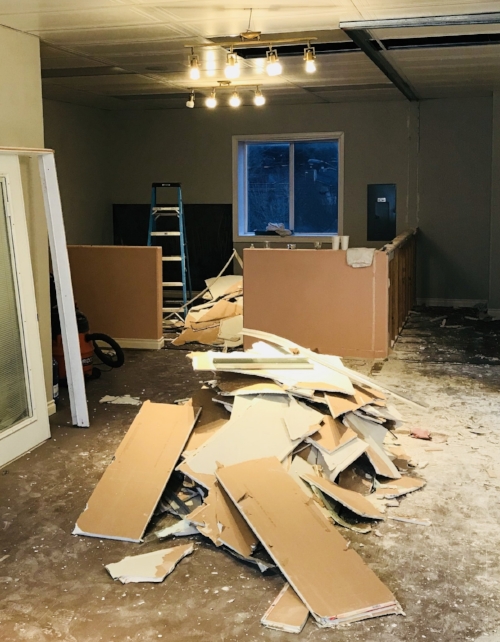Demolition Days: The Metal of Something New
The remains of the walls after Day 1
As a modern American practitioner of Chinese medicine, I have often wondered just how relevant an ancient perspective can be in contemporary life. How much of the symbolism and language that we call “Classical,” can touch and feel our present situation? Is Chinese medicine, its cosmology and approach, able to grasp who we are and what we do? Or is it merely a relic to who we have been?
“Loud noises!” shouts my friend and business partner, Travis Kern, as he turns on a saw, that buzzes like a ferocious bumble-bee orchestra. I watch, as it cuts a line through the Sheetrock of the wall in front of us. There’s nothing quite like sharp metal going to work.
Our newly acquired clinic space is being rearranged. We are doing the “build-out” ourselves. And the first stage in the process? Demolition. The unnecessary walls have to come down before the new walls can go up.
Several hours before, I am standing in my back yard in a very uncomfortable pose. My neigong teacher and friend Brandon, calls it Wuji stance. Though you wouldn’t know I am uncomfortable by looking at the “slight smile” on my face, you might be able to tell if you looked close enough to see my entire body “slightly” shaking.
Wuji is one of the first practices taught in traditional neigong. It is considered a basic practice, because it builds a kind of essential conductivity in the tissues of the body. Unfortunately, in order for this conductivity to be built, the body has to become song.
Song is a term in Chinese associated with the idea of relax or release. Brandon says that it is not just a quality of relaxation within the muscles, but a stretching of the tendons and fascia: “Like steel wrapped in wool.” If a person is able to become song, they can more easily conduct qi. Once qi can be conducted, then it can start to be worked with and used for other purposes.
In order to become song, the person has to learn to “sink the qi” downward. Downward, is always the first direction when learning neigong or tai chi. “Sinking,” is associated with the Metal element in Chinese medicine. And it always seems to be the most difficult.
Why is sinking so difficult? I’m not sure… maybe it’s because the modern body is conditioned by chairs and unnatural movement patterns to favor above and not below; maybe it’s because the modern mind is conditioned to exist only from the neck up; maybe it’s because modern culture worships expansion and growth and shuns contemplation, receptivity, and allowing. Why is sinking so difficult? I’m not sure. But trying to sink the qi sucks! It sucks big time.
In neigong, sinking the qi must be done first. If sinking isn’t done first, then too much qi can “rise” to the head, and cause problems such as insomnia, anxiety, and even mania or delusion (if extreme). This is because the goal in neigong isn’t simply to go up to the head, it is to go into (and become) the whole.
Becoming song, and thus “sinking the qi,” requires a person to give up all of the unnecessary tension that they are used to holding, in order to rest upon the basic structure of the body. Our points of tension are difficult to let go of, because they are what we have been using to “hold us up” for a long time. It makes sense then, that we have to let go of the things that hold us up, in order to sink and go down.
As I watch Travis’ metal saw cut through dusty Sheetrock, I am reminded that Sheetrock is made from gypsum or, in Chinese, Shi Gao. Shi Gao is used in Chinese herbal medicine to treat the Lung (which happens to be associated with the Metal element), when certain patterns of pathology “attack” the lung in form of a cold or flu.
Seeing that metal saw cut into the metal wall after trying to “sink my qi” (the direction of metal) all of that morning, provided me with a direct example of how the symbolic language of Chinese medicine is still relevant today.
There is something, perhaps innate, about beginning, that requires Metal. In the case of the clinic, Metal is taking down unnecessary walls and clearing the space of what was. In the case of neigong training, it is releasing the unnecessary tension and holding patterns of the body so that the tissues become more able to conduct qi. In both cases, we start with Metal.
As Travis and I sat back and enjoyed a not-quite-cold-enough but still enjoyable beer, we reflected upon the accomplishments of the day. Our work was shown back to us by the newly minted openness in our store, and in that moment, we drifted into feelings of serenity. As it turns out, “sinking the qi” is not always so difficult.

